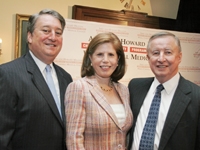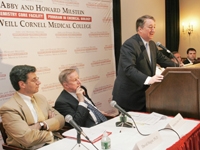Although no longer a significant public health threat in the U.S., malaria and tuberculosis continue to have devastating impacts in much of the world, particularly in the former Soviet Union and sub-Saharan Africa. A recent gift of $7.25 million from Howard and Abby Milstein will target these diseases and others that affect the developing world by establishing the Abby and Howard P. Milstein Chemistry Core Facility and the Abby and Howard P. Milstein Program in Chemical Biology at Weill Cornell Medical College.

From left: Howard and Abby Milstein and Dr. Antonio Gotto at the June 5th press conference announcing the establishment of the Milstein Chemistry Core Facility and Program in Chemical Biology.
Specifically, the gift will be used to create and staff a core facility that will design and purify compounds to support research within the Chemical Biology Program, as well as help scientists study many other diseases. The new, multidisciplinary Chemical Biology Program will combine genetics, biochemistry, molecular biology and immunology with chemical biology to create novel chemical compounds with which to validate drug targets. Ultimately, compounds of significant interest will be donated to public-private partnerships that are oriented toward not-for-profit drug development, fostering collaboration between the medical research and business communities.

From left: Dr. David Hajjar, dean of the Graduate School; Dr. Gotto; and Howard Milstein.
"This is a very important step that will enable us to make significant progress toward developing new therapies," said Dr. Antonio Gotto Jr., dean of Weill Cornell Medical College. "It also represents a new type of partnership between philanthropy, academia and industry."
The idea originated with a presentation by Dr. Carl Nathan, the R.A. Rees Pritchett Professor of Microbiology and chair of the Medical College's Department of Microbiology and Immunology, during a meeting of the Medical College's Board of Overseers.
"We have a part to play in the business community by supporting selfless doctors and researchers," said Mr. Milstein, who has been an overseer of the Medical College since 1989. "It was the logic of Dr. Nathan's presentation and the need that rang the bell—this is a vital area."

Dr. Carl Nathan, who will direct the Program in Chemical Biology, discusses the vital need to alleviate Third World diseases.
Dr. Nathan, who will direct the Program in Chemical Biology and serve on an advisory committee to the Core Facility director, is specifically interested in combating antibiotic-resistant strains of tuberculosis and malaria that have evolved over the last half-century, an area largely neglected by pharmaceutical industry because of its poor market value. According to the Global Forum for Health Research, currently less than 10 percent of global spending on medical research goes to conditions that account for greater than 90 percent of the global disease burden, a problem that has come to be known as the 10/90 gap.
"The question is, do we want to go back to a time when life-threatening infections are considered routine?" asked Dr. Nathan. "This is not a past we want as our future. University-based scientists can step in and help find solutions to these diseases."
Photos by Eileen Miller.

